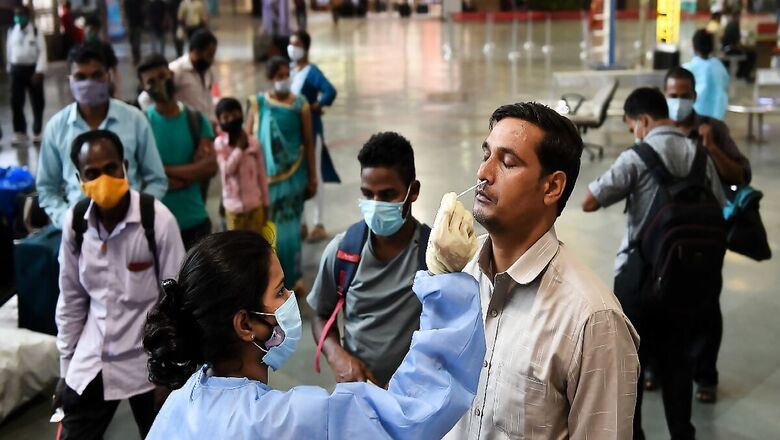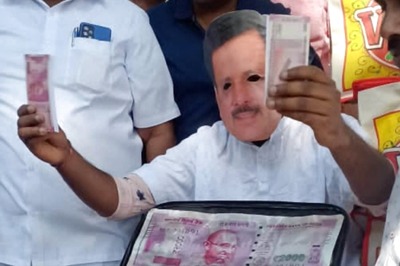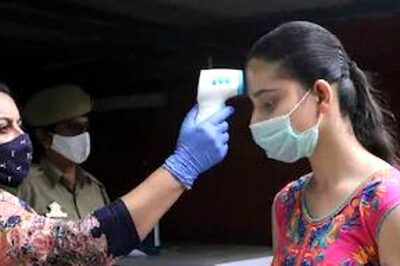
views
Fighting a second wave of the coronavirus pandemic, India registered 2,61,500 new cases in the last 24 hours, the highest so far, and 1,501 deaths. The country has now recorded more than 2 lakh COVID-19 cases for four consecutive days. Public health experts are worried that a new and possibly more virulent virus variant, known as the double mutant, could be responsible for this fresh surge in infections across India.
As people struggle to understand the rapidly-changing health scenario, we reached out to one of the most reputed epidemiologists in the country, Professor K. Srinath Reddy, to answer questions that are on top of everyone’s mind, right now. Professor Reddy is President, Public Health Foundation of India (PHFI), and serves as an Adjunct Professor of Epidemiology at Harvard (2014-2023).
1. Which variant of coronavirus am I most likely to encounter in the India?
A. It would depend on which part of India you reside in or travel to. In Punjab and Delhi, it is more likely to be B.1.1.7 (the variant also known as the Kent or the British mutant). In Maharashtra and neighbouring states, you are more likely to encounter B.1.617 (also known as the ‘double mutant’). Though this was first reported from India, it has also been noted in the UK, the USA, Australia, Singapore, Belgium, Germany, New Zealand, Namibia and South Africa. Other mutations too have been reported from different parts of India but these two are presently the variants of concern (VOCs) in India.
The N440K variant reported from Kerala has also been reported from Andhra Pradesh and Telangana. This variant has been reported in 16 countries. Variants of South African and Brazilian lineages have also been reported in small numbers in India.
2. Do the vaccines work against the variant found in India?
A. Tests are being carried out to assess this. Covishield is India’s version of the AstraZeneca vaccine, a virus-vector vaccine directed against the spike protein. The B.1.617 variant has a mutation component called E.484Q which is like E.484K that has been shown to have lower efficacy of immune response to the AstraZeneca vaccine in South Africa. We need information on what is happening to that vaccine’s efficacy against Covishield in India.
Covaxin is an inactivated virus vaccine. It offers a larger platter of viral antigens to the body for an immune response. These include, but are not restricted to, the spike protein. The vaccine may, therefore, be effective against variants which display mutations against the spike protein. Preliminary studies in India suggest that this is indeed so.
3. If the vaccines are working, why do I keep hearing about “breakthrough” cases?
A. All of the currently trialled and approved vaccines are designed to protect against severe COVID-19 disease and death, not against infection per se. They are systemic vaccines administered by intramuscular injection and elicit systemic immune responses, through IgM and IgG antibodies as well as cellular immunity through T cells. They do not produce IgA, which is a secretory antibody that can wash off the virus from mucosal surfaces of the nose and throat. So, a mild infection is still possible. However, the strong systemic immunity induced by the vaccine can fight off the virus and prevent it from causing severe infection or death. Mucosal vaccines, which can be inhaled and stimulate the body to produce IgA, are still in development and clinical trial stages. We have to see how effective they will prove to be against the infection itself.
4. Are there other variants I should be worried about? Is it true that there are variants that can “evade” the vaccines?
A. The variant which was first reported from South Africa has shown reduced levels of efficacy for several vaccines, compared to the original wild virus. Even with somewhat reduced efficacy, many of those vaccines still offer more than 50 per cent protection against severe disease. We do have several vaccines on the anvil, which are being configured to overcome the vaccine escape challenge of the variants.
5. Am I going to need a booster shot?
A. Yes, you do, with the currently available vaccines. The first shot primes your immune system for a response, putting it in first or second gear. The booster shot revs up your immunity and moves it to top gear.
6. Given all these unknowns about the variants, shouldn’t I just stay home even after I’m vaccinated?
A. You should observe precautions like wearing a proper mask the proper way, while avoiding crowds and ill-ventilated areas. Your movement out of home must be guided both by those common sense precautions and observance of the government regulations which are in force at a given time. Whether it is the original virus or the variant, it can enter your body only through the nose, mouth and eyes. If you can protect those gateways, you can remain safe against the variants too.
Read all the Latest News, Breaking News and Coronavirus News here. Follow us on Facebook, Twitter and Telegram.




















Comments
0 comment